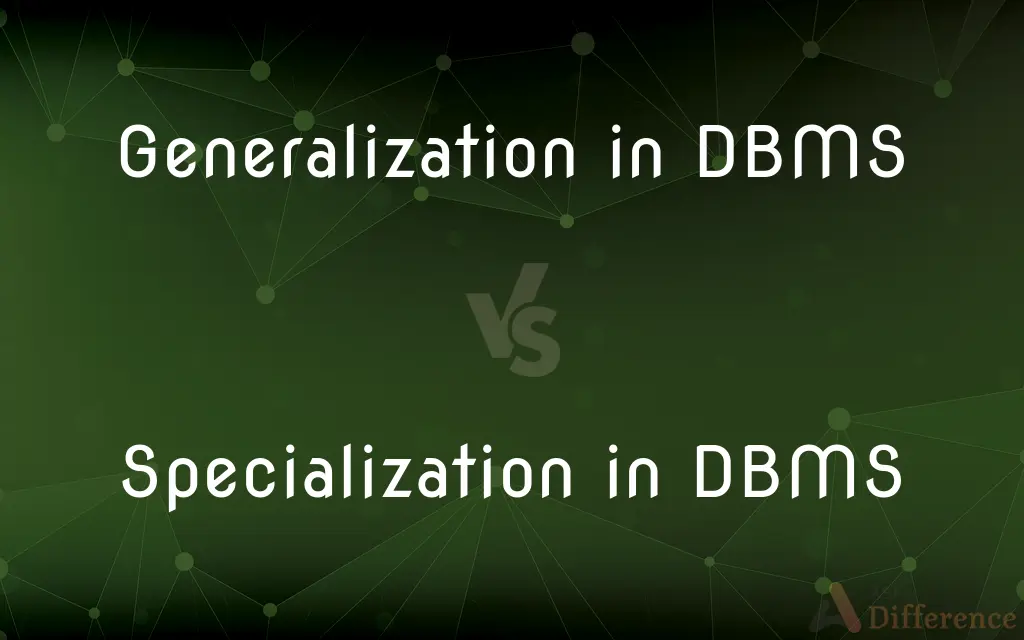Generalization in DBMS vs. Specialization in DBMS — What's the Difference?
By Tayyaba Rehman — Published on January 17, 2024
Generalization in DBMS combines similar entities into a single, more general entity, while Specialization is the process of defining subgroups within an entity based on distinct characteristics.

Difference Between Generalization in DBMS and Specialization in DBMS
Table of Contents
ADVERTISEMENT
Key Differences
Generalization in DBMS is a bottom-up approach where two or more entities with common features are combined to form a more general entity. This process helps in creating a more simplified and organized database structure. Conversely, Specialization in DBMS is a top-down approach where a general entity is divided into specialized entities based on distinct features or characteristics.
Generalization reduces redundancy by creating a generalized entity that can cover common characteristics of multiple entities. For instance, 'Car' and 'Motorbike' entities can be generalized into a 'Vehicle' entity. On the other hand, Specialization allows for more detailed and specific data representation by creating subcategories. For example, the 'Employee' entity can be specialized into 'Manager' and 'Worker' based on job roles.
Generalization is often used when designing the database to bring simplicity and reduce complexity. It helps in creating a hierarchical model where the higher level represents a more generalized view. Whereas, Specialization is used to enhance the database by adding more specific details, enabling a more precise and detailed data structure.
In terms of database design, Generalization aims at creating a broad classification by focusing on similarities among entities, leading to a more abstract level. In contrast, Specialization focuses on the differences, leading to more concrete and distinct categories within the database.
Generalization typically leads to a reduction in the number of entities by combining them, which can simplify queries and data manipulation. In contrast, Specialization might increase the number of entities, allowing for more specific and detailed queries but potentially increasing the complexity of database management.
ADVERTISEMENT
Comparison Chart
Approach
Bottom-up (combining entities)
Top-down (dividing an entity)
Focus
Common features among different entities
Unique features that differentiate subgroups
Result
More generalized and broader entity
More specific and detailed sub-entities
Use in Design
Simplifies and organizes database structure
Adds details and precision to the database structure
Impact on Queries
Can simplify query structure
Enables more detailed and specific queries
Compare with Definitions
Generalization in DBMS
Combining similar entities into a generalized one.
Generalization in DBMS merged 'Cats' and 'Dogs' into 'Pets'.
Specialization in DBMS
Adds detailed, specific entities.
We implemented specialization to add more detailed employee roles.
Generalization in DBMS
Focuses on commonalities among entities.
Generalization identified shared attributes to create a 'Vehicle' entity.
Specialization in DBMS
Focuses on distinguishing characteristics.
Specialization created a 'Sports Car' entity separate from 'Car'.
Generalization in DBMS
Creates broader, more abstract entities.
Generalization led to the creation of a 'Person' entity from 'Student' and 'Teacher'.
Specialization in DBMS
Increases entities for detailed queries.
Specialization led to more entities, enabling detailed data analysis.
Generalization in DBMS
Simplifies database structure.
We used generalization to simplify our complex entity relationships.
Specialization in DBMS
Dividing a general entity into specific subgroups.
Specialization in DBMS split 'Employee' into 'Manager' and 'Technician'.
Generalization in DBMS
Reduces redundancy and complexity.
Generalization reduced redundant fields in our database.
Specialization in DBMS
Enhances database with precise details.
Specialization in our DBMS allowed for more precise data categorization.
Common Curiosities
What is Specialization in DBMS?
It's the process of creating subgroups within an entity based on distinct characteristics.
How does Specialization enhance a database?
It adds detailed and specific entities, allowing for precise data categorization.
Why is Generalization important in DBMS?
It simplifies the database structure and reduces redundancy.
Is Generalization a top-down approach?
No, it's a bottom-up approach, combining entities into a more general form.
Can Generalization and Specialization co-exist in a DBMS?
Yes, they are often used together to balance simplicity and detail in a database.
What are the benefits of Generalization in database design?
It leads to simpler, more manageable database structures with reduced complexity.
Can Specialization lead to data redundancy?
It can, if not managed properly, as it creates more specific entities.
How do Generalization and Specialization relate to inheritance in DBMS?
They are similar concepts, with Generalization resembling superclass formation and Specialization resembling subclass creation.
What is Generalization in DBMS?
It's the process of combining similar entities to form a more generalized entity.
How does Specialization affect database queries?
It allows for more detailed and specific queries, although it can increase query complexity.
In what scenarios is Specialization preferred in DBMS?
It's preferred when detailed and precise data representation is needed, like in complex business processes.
Are Generalization and Specialization used in relational databases?
Yes, they are commonly used in relational database design and modeling.
Does Generalization affect data integrity?
It can, as combining entities might lead to a loss of specific details, but it usually simplifies data integrity rules.
Can Generalization lead to data loss?
If not carefully implemented, it might lead to a loss of specific details in the generalized entity.
How does Generalization impact database performance?
It can improve performance by simplifying the schema and reducing query complexity.
Share Your Discovery

Previous Comparison
Ingestion vs. Egestion
Next Comparison
Audi A5 vs. Audi S5Author Spotlight
Written by
Tayyaba RehmanTayyaba Rehman is a distinguished writer, currently serving as a primary contributor to askdifference.com. As a researcher in semantics and etymology, Tayyaba's passion for the complexity of languages and their distinctions has found a perfect home on the platform. Tayyaba delves into the intricacies of language, distinguishing between commonly confused words and phrases, thereby providing clarity for readers worldwide.














































